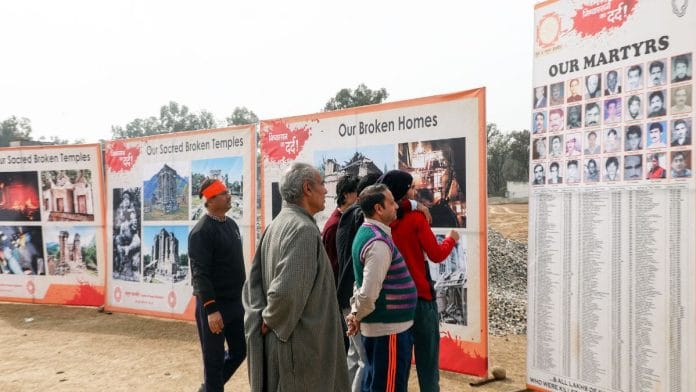New Delhi: Government employee Ranjhan Jyotshi woke up on 24 April to the news of Kashmiri Pandit employees being asked to work from home in at least two districts of the Kashmir valley. It’s one the after effects of the Pahalgam attack. Having moved from Jammu to Bijbehara more than ten years ago under the prime minister’s special rehabilitation package, he’s worried that the minority Kashmiri Pandit community will be targeted.
Since he and other families returned to the valley, they’ve been calling for better safeguards and security. The announcement of work from home has once again left the community wondering whether or not they can have a future in Kashmir—or if it’s just a dream.
It has reignited long-standing fears and uncertainties within the community. While framed as a safety measure, the move has left many Pandits questioning the repeated cycles of violence that continue to restrict their freedom and mobility.
“Soon after the abrogation there were several attacks on Kashmiri Pandits by militants. That should have been enough for the government to take steps,” said Jyotshi.
Instead, their homes have become prisons. Moments after the attack, they’ve been confined to their houses and community members are in a state of anxiety. Now, they want the government to allow a ‘transfer policy’—allowing employees to live and work in both Jammu and Kashmir. Under the current scheme, they have no option but to remain in their housing clusters.
“Whenever there is a targeted killing or an attack, Kashmiri Pandits become the first ones to be confined. Their makeshift accommodations have turned into jails. Security is beefed up. They are not allowed to come out of the huts after 5pm,” said Mohit Bhan. As a non-migrant Kashmiri Pandit, he has his own house but empathises with newly returned residents.
“The community is suffering in Kashmir on multiple fronts,” he added.
Both Jyotshi and Bhan understand the government’s reaction to keep them safe, but say that it’s about time that long-term solutions be put in place.
“We were not asking for the moon or stars, we were asking for the safety of our lives,” said Jyotshi.
Also read: Navy officer Vinay Narwal’s family wants the media out—‘Please don’t ruin our reputation’
History repeats itself
In the years that he’s called Kashmir home, Jyotshi has been through this more times than he can count. However, the horror of the Pahalgam attack has shaken the community.
“Work from home is necessary, but is this a permanent solution?” said Jyotshi.
An order was issued by the chief education officer (CEO) of north Kashmir’s Baramulla and south Kashmir’s Anantnag on Wednesday evening which asked the Kashmiri Pandit employees to work from home for a week and till further orders.
Sitting in his home, he recalls all the past attacks in Kashmir like a litany.
Twenty-three Kashmiri Pandits in Wandhama in 1998. Another 24 Kashmiri Pandits in 2003 in south Kashmir’s Nadimarg. The killings of 35 Sikhs in Chattisinghpora in 2000. And then the violence and deaths after militant Burhan Wani was gunned down.
After the abrogation of Article 370, Kashmiri Pandits say that they are once again being targeted. Since 2019, several members of the community, including some PM package employees, and non-local workers have been killed in waves of targeted attacks across the valley. The Resistance Front, an offshoot of Pakistan-based Lashkar-e-Taiba outfit, claimed credit. It’s the same group that has also claimed the attack in Pahalgam. In 2021, militants checked the identification cards of two school teachers in Srinagar before gunning them down.
“The situation in Kashmir should be made viable for Kashmiri Pandits to live without the temporary halts on even being able to go out of their homes,” said Jyotshi.
Also read: Prayagraj to Himachal—Kashmiri Muslims forced to leave college, home. Many slept at airports
Citizens or caged birds?
In March, this year, the Lieutenant Governor of J&K Manoj Sinha had said that efforts to remove all obstacles to ensure “dignified return” of Kashmiri Pandits was underway in the Valley.
But with the Pahalgam terror attack, many Kashmiri Pandits are wondering if they returned ‘home’ too soon, too fast.
In 2021-2022, following a spate of targeted attacks in Kashmir, the PM package employees from the minority community had gone on a 315-day long protest demanding that the Union government led by the Bharatiya Janata Party (BJP) ensure their safety or transfer them out of Kashmir.
“The people who moved back under the package were not given the accommodations they deserved. The continuous attacks in the past five years have destabilised the whole process,” said Bhan.
What’s more, they are increasingly isolated.
“It looks like they are in no man’s land. So, nobody is allowed to enter their territory and they are not allowed to tread outside as well. They are all caged pigeons,” he said.
Kashmiri Pandits want the government to take them into confidence and open channels of communication with religious, political and trade bodies in Kashmir.
“It’s painful to keep trying to improve our lives only to be hit by a new blow,” said Suneil Raina, a 42-year-old government teacher, who moved to Kashmir from Jammu in 2010 under the rehabilitation package.
“Tensions are so high that even if you see someone with a bag in their hands, you immediately get scared,” he said.
Raina told ThePrint that the Pahalgam incident has, however, not only impacted the Kashmiri Pandits but Muslims as well who are now being beaten up and asked to leave from other states of India. “Our Muslim brothers have supported us, they used to bring things for us,” he said. “In every religion, there are good people and bad people. And these terrorists, they have no religion.”
(Edited by Theres Sudeep)






